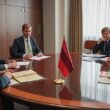The SPD parliamentary group in the Bundestag has welcomed the decision by the Federal Office for Migration and Refugees (Bamf) to financially support Syrian migrants who plan to return to their homeland permanently. “It’s not the right time to think about a large-scale return of Syrians” said Sebastian Hartmann, the SPD’s parliamentary group’s spokesperson for the interior, to the Welt (Thursday edition). “If refugees from Syria see a chance for a safe life in their homeland after the fall of Assad, we should unconditionally support that.”
Participants in the program can receive up to €1,700 in one-time support, in addition to flight tickets. Lamya Kaddor, the Green parliamentary group’s spokesperson for the interior and homeland, said: “The Bamf’s benefits come too late and set the wrong incentives. A safe return to Syria is currently too rare and requires the situation to further stabilize.”
Konstantin Kuhle, the FDP’s parliamentary group’s vice chairman, called for a further strengthening of voluntary departures: “Those who return to their homeland voluntarily have better chances of building something up there. This makes a further flight less likely. Voluntary departure is significantly cheaper than deportation, which involves high costs for charter flights and the accompaniment by the federal police.”
The CDU parliamentary group does not go far enough with the return program, it should also be supplemented by other incentives such as a return concept, said the CDU’s parliamentary group’s vice chairwoman, Andrea Lindholz (CSU). “This concept must include the immediate deportation of Syrian criminals and a deportation plan for non-integrated individuals, as well as criteria for the stay of integrated Syrians.”
Instead of taking the initiative and establishing contact with the new Syrian authorities, the federal interior minister, Nancy Faeser (SPD), is irritating with her proposal for voluntary reconnaissance trips. “The assessment of whether the situation in Syria has changed sufficiently and sustainably for a return to be possible must be made by the German authorities themselves.”
The AfD parliamentary group demands recognition of the new legal situation, the revocation of a potential protection status, and the unconditional deportation of those affected, regardless of whether they favor a voluntary return or may even do so only after receiving financial payments, explained the AfD’s parliamentary group’s spokesperson, Gottfried Curio.
Sahra Wagenknecht, the BSW’s federal chairwoman, considers a one-time and limited financial contribution to the costs of returning to Syria to be “sensible, as it would mean a long-term relief for taxpayers.” Those who take advantage of such a return aid should, however, be obligated not to seek the way back to Germany again.
The Left parliamentary group stated that reconnaissance trips by Syrians are necessary. “It would be absurd to assume that people would easily decide to return without knowing the situation on the ground. This is all the more true in light of the fact that it is still completely open how politics will continue in Syria” said the Left’s parliamentary group’s spokesperson, Clara Bünger. All demands for deportations to Syria must be categorically rejected.
Migration experts welcome the step by the Bamf. “In a certain sense, the sum of money is a bargain if people return who are currently living almost entirely on social assistance” said asylum law expert Daniel Thym of the University of Konstanz to the Welt.
“In this case, the cost to the German state of accommodation, social assistance, healthcare, and the education of children is much higher every month.” A incentive will only be a factor in a limited scope and “it will be a small factor in the decision-making process.”
Thym does not consider the return program to be premature: “Legally, it is still too early for a revocation of the protection status, as the situation is volatile. However, it can be said that the situation has improved. In that sense, the program is sensible.”
Migration law expert Winfried Kluth of the University of Halle (Saale) praises the aspect of voluntariness: “The affected individuals can generally assess the situation in their homeland region better than the authorities here. Therefore, it is sensible to support those who want to return, despite the still uncertain overall situation.





